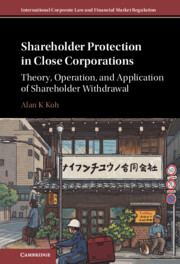 Shareholder Protection in Close Corporations
Shareholder Protection in Close Corporations The Divergent Lives of Withdrawal in Two Close Corporation Forms across One Hundred Corporation Laws
from Part 2 - Operation
Published online by Cambridge University Press: 14 October 2022
Chapter VI turns to the US, where various states developed diverse solutions to shareholder conflict for over one hundred close corporation legal forms. While many US states recognize withdrawal as a solution to majority-minority shareholder conflict in US close corporations, several states have resisted or even renounced withdrawal. The attitude towards LLCs, which are rapidly growing in popularity across the US, is more ambivalent, as state legislatures and judges have been slow to respond to problems of intracorporate conflict and oppression. While the contractarian-led scholarly debate on whether corporate law should be mandatory or default is instructive, the reality that withdrawal is often missing from state LLC statutes is not attributable to state legislatures taking reasoned policy positions. Rather, withdrawal’s absence in LLCs is caused by incentives created by federal taxation policy. There are signs that history moves in circles as withdrawal remedies seem to be (re)emerging in LLCs.
To save this book to your Kindle, first ensure no-reply@cambridge.org is added to your Approved Personal Document E-mail List under your Personal Document Settings on the Manage Your Content and Devices page of your Amazon account. Then enter the ‘name’ part of your Kindle email address below. Find out more about saving to your Kindle.
Note you can select to save to either the @free.kindle.com or @kindle.com variations. ‘@free.kindle.com’ emails are free but can only be saved to your device when it is connected to wi-fi. ‘@kindle.com’ emails can be delivered even when you are not connected to wi-fi, but note that service fees apply.
Find out more about the Kindle Personal Document Service.
To save content items to your account, please confirm that you agree to abide by our usage policies. If this is the first time you use this feature, you will be asked to authorise Cambridge Core to connect with your account. Find out more about saving content to Dropbox.
To save content items to your account, please confirm that you agree to abide by our usage policies. If this is the first time you use this feature, you will be asked to authorise Cambridge Core to connect with your account. Find out more about saving content to Google Drive.